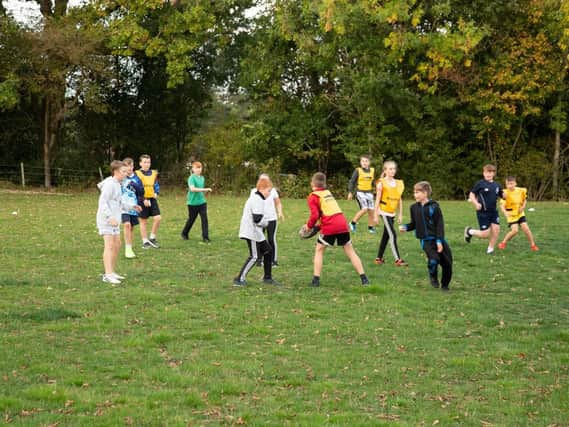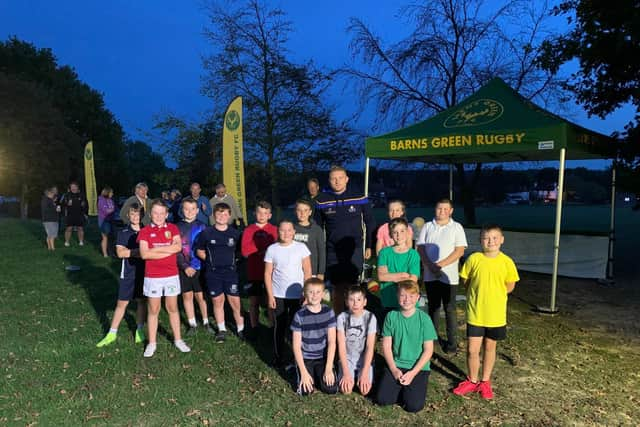Lockdown has hurt - but rugby's green shoots are appearing across Sussex


This huge playing community is a mix of men, women, boys and girls ranging in age from five to over 60. Furthermore, we are an extended family with an infrastructure of clubs, schools, coaches, managers, volunteers, parents, spectators, sponsors and referees.
Consequently, a sizeable chunk of Sussex’s 850,00 population is touched by the game.
Advertisement
Hide AdAdvertisement
Hide AdRugby threatened to grind to a halt in the face of the pandemic onslaught. As we were going into lockdown in March, so Australia was recovering from its bushfires. Eucalyptus species are quick to recover and grow in devastated areas. However, here, this is our first taste of devastation – but we have been resilient and similarly quick to recover.


In March, some of us were optimistic that we would be back to normal by October. This optimism has turned to realism.
A basic component of rugby is the scrum, which comprises 16 people from different households grasping each other. The concepts of the rule of six and ‘hands, face and space do not readily sit with the laws of the game. This has been frustrating because other sports with less contact have been able to resume since July.
To date, the only concession to full contact rugby has been the professional game. This makes for good television but is not providing an outlet for the grassroots player. However now we have a second lockdown in England, all sports are in the same boat with organised sport being suspended. The only exceptions are internal school games.
Advertisement
Hide AdAdvertisement
Hide AdSo where is rugby’s eucalyptus and the drive for creating a viable playing outlet? At the very top of the pyramid, the Rugby Football Union (RFU) is in negotiations with the Department for Digital, Culture, Media & Sport (DCMS) about a programme to return to full contact for all levels of rugby.
Rugby has six stages and to move from October’s non contact Stage D, it must convince DCMS, Public Health England and No 10 that it is safe to do so. Despite the restrictions, mini and junior rugby is thriving.
There is a pent-up demand and a welcome release to be out in the open and enjoying safe and responsible organised games. At my local club, Midhurst, we have staggered starts for different age groups with a maximum of 75 minute sessions. There are regular sanitisation breaks. This safe playing regime is replicated across the county.
The greenest (with a hint of yellow) shoot is Barns Green, which started its new junior section in September, this year.
Advertisement
Hide AdAdvertisement
Hide AdFor older boys and girls, and adults there is a new variation of touch rugby called Ready 4 Rugby. It concentrates on preparing players for full contact through its four principles of go forward, support, continuity and pressure.
Before the new lockdown, clubs were starting to play this against each other at both junior and adult levels. In training, some limited and highly supervised contact was permitted under Stage D. We have assumed (rather dangerously) that we will return to Stage D after lockdown.
There are 34 clubs across Sussex. Clubs have two main issues – managing their finances and retaining players. The smaller clubs are financially comfortable – if they are not playing, they are not incurring costs.
The larger clubs have overheads and are run on business lines. They have had to balance limited income with commitments to staff and loans on facilities. A further but understandable blow is that some sponsors have been forced to withdraw. On the positive side, clubs have been supported by Local Authorities, the RFU, Sussex RFU and Sport England.
Advertisement
Hide AdAdvertisement
Hide AdSince the first lockdown, clubs have bounced back with Heathfield & Waldron, Crawley and Burgess Hill being particularly enterprising. As a consequence, they have been able to generate bar income by reproducing a club atmosphere in accordance with government guidelines. The game’s big challenge is to retain its adult players – particularly the mobile younger ones.
Up until the second lockdown, there was talk in the socially distanced bars that the RFU was close to agreeing an adaptive game with DCMS. This would allow some contact but no scrums or mauls. In the meantime Sussex is looking to promote a series of Ready4Rugby matches which create fun but minimise travel.
The bottom line is that we look forward to a vaccine – but we can keep playing if none is immediately forthcoming.
* Simon Flint, the author of this article, is director of playing for Sussex RFU and a coach at Midhurst RFC. The thoughts expressed in this article are personal and do not necessarily reflect those of Sussex RFU or Midhurst RFC.